Welcome to the January 2021 edition of the Curious Tea subscription, which is a Taiwan Special! Here’s a closer look at the four exciting new teas that we are sharing with our subscribers this month.
The first light tea this month is a high mountain Milk Oolong from Alishan that has a characteristic smooth and creamy mouthfeel and taste.
The second light tea is a rather unusual Bi Luo Chun from San Xia that has a classic vegetal green tea profile.
For the dark side of the selection we selected a Hong Cha made from the recently introduced and still very uncommon Ying Xiang cultivar.
Finally, the last tea we are featuring this month is a heritage-style Mi Xiang Wu Yi Oolong created by our tea master to showcase a traditional type of tea made in Taiwan 30+ years ago.
Our Discovery subscription boxes contain 10g taster pouches of all of the above mentioned teas. If you are a subscriber you will benefit from a 10% discount on all teas from our tea shop!
Let’s get into further detail on these Taiwanese teas featured in our January tea subscription boxes.
Alishan Milk Oolong
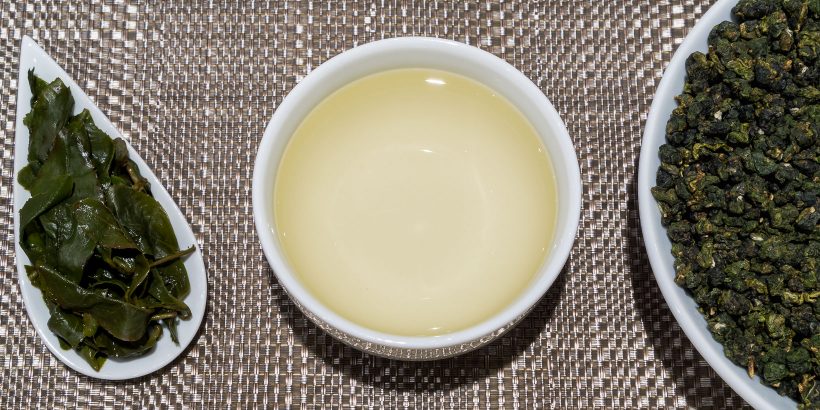
Our Alishan Milk Oolong (阿里山金萱烏龍茶) is a wonderful and different sort of tea produced from the leaves of the Jin Xuan cultivar, developed in Taiwan in the 1980’s. It is similar to our Award Winning Organic Milk Oolong as it is made from the same cultivar. Yet the growing location gives a different sort of character to this Alishan version. While also exhibiting a milky aroma, mouthfeel and taste that Jin Xuan cultivar is famous for, this flavour is also balanced off by stronger floral and vanilla notes that High Mountain Oolongs are renowned for. This particular batch from Mr Chen was handpicked and processed in November 2020.
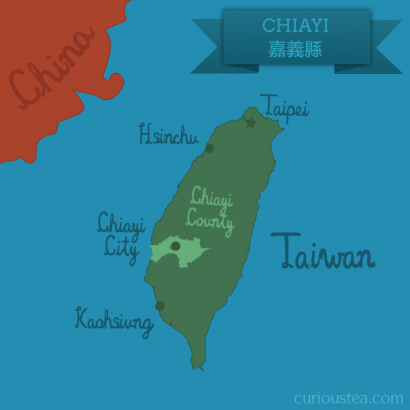
We carry three Milk Oolong teas at Curious Tea from different terroirs of Taiwan. The Award-Winning Organic Milk Oolong is the most popular but the high mountain Gao Shan Jin Xuan Oolong and Alishan Milk Oolong are both beautiful examples of teas from the high mountain terroirs of Taiwan.
Jin Xuan cultivar is also known as the Golden Daylily (Jin Xuan – 金萱) or TRES #12, the number given to it by the Taiwan Research and Extension Station. Jin Xuan cultivar is very popular with farmers since the plants are more hardy and produce a higher yield. From a tea lover’s point of view, Jin Xuan is an attractive aromatic drink with a lovely sweet character. It is particularly popular for the smooth creamy and milky aroma, texture and taste.
As Milk Oolong has become extremely popular, please be aware of imitations. There are plenty of milk oolongs (whether from Jin Xuan cultivar or others) that are flavoured either with milk or vanilla in order to imitate or enhance the natural taste that the leaves of Jin Xuan develop. Any genuine Milk Oolong is always produced from the Jin Xuan cultivar and should not be flavoured or enhanced with additional flavours in any way.
Our Alishan Milk Oolong is sourced with the help of a Taiwanese Tea Master from the Alishan Scenic Area of Taiwan and it is a real and authentic High Mountain Milk Oolong. It solely utilises the Jin Xuan cultivar that is grown at an altitude of 1,200-1,250m. The High Mountain nature of this tea is immediately evident – the flavours are just that little bit more cleaner and crisper than the lower altitude counterparts. The liquor that is produced is very light and quite brisk. It has a subtle natural milky aroma, mouthfeel and taste. This High Mountain Oolong is very fresh tasting, with sweet notes of wild flowers and vanilla.
This Taiwanese Alishan Milk Oolong tea is best brewed at 90°C for 3-5 minutes according to your taste and can be brewed multiple times, increasing steeping time with each next brew if desired. For best results brew gong fu style.
You can also buy Alishan Milk Oolong tea in our online shop.
San Xia Bi Luo Chun
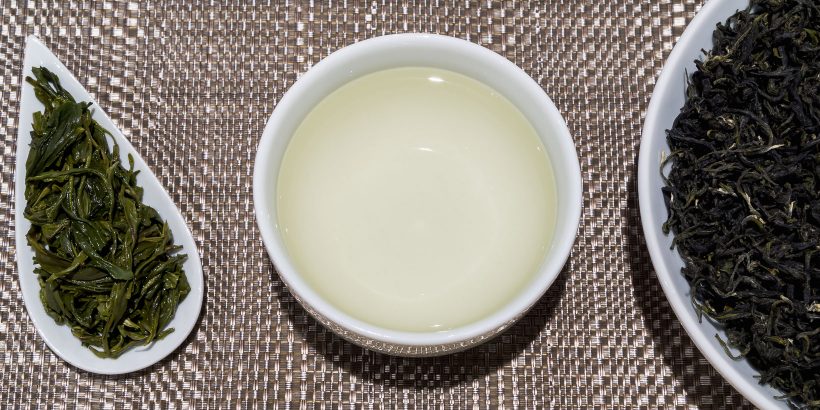
San Xia Bi Luo Chun (三峽碧螺春) is a classic green tea from Sanxia District of New Taipei City in northern Taiwan. Carefully handpicked leaves of the Qing Xin Gan Zi varietal are processed in a traditional style to create a vegetal liquor with herbaceous and fruity notes and a clean taste. Grown at an altitude of between 300m and 600m, it was harvested and processed in June 2020.
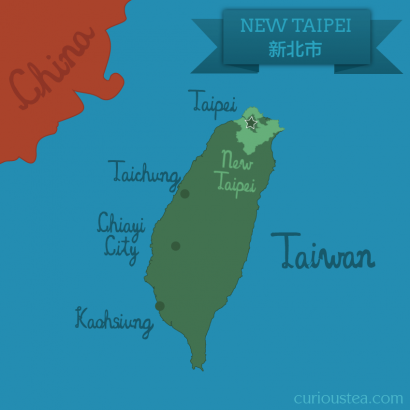
Bi Luo Chun ‘Green Snail Spring’ is a classic Chinese green tea, with the original type hailing from the Dong Ting tea growing area of Jiangsu Province. Such is the popularity of this tea that the name became a popular name for other green teas made in similar style. Typically they exhibit a tippy leaf with a coiled shape resembling a snail. Often however, the name is descriptive of the flavour profile rather than the appearance of the leaf. Such as the case in our San Xia Bi Luo Chun, it is made of single leaf with some white buds but they are not coiled in the distinctive snail shape. Instead the name is attributed to the flavour, having a classic vegetal green tea taste and aromatic liquor common to other Bi Luo Chun teas.
The teas from Sanxia District are largely outliers from other Taiwanese teas in terms of picking standard and production. Unlike many other regions of Taiwan that have distinct harvest seasons and where the leaves are harvested with stalks, utilising the top 2-4 leaves and the bud, the harvest in Sanxia occurs when the leaves are picked every 10-14 days. Only the top leaves and buds are harvested, so the leaves are picked without stalk, in a style that is more common with the Mainland Chinese standard of picking. Furthermore, this tea comes from a small cooperative factory of Mr Lee. They work with about 200 very small scale growers in the area who sell their tea leaves to the factory. Depending on the quality and characteristics of each harvest the factory then decides on the best tea to make from each harvest, varying between styles such as Bi Luo Chun or Long Jing for green tea, various types of oolong or by making Hong Cha (red/black tea).
Our San Xia Bi Luo Chun consists of neat, dark green leaves. It produces a light vegetal liquor that is aromatic, with a vegetal and grassy scent. The flavours are light and clean with minimal astringency or dryness. The taste has a classic vegetal green tea profile with herbaceous brassica and umami flavours and light floral and fruity notes. The lasting aftertaste is bright and clean with slight dryness. This is an excellent green tea that will definitely appeal to fans of classic green teas of Mainland China.
It is best brewed at 80°C for 2-3 minutes according to your taste and should be brewed multiple times, increasing steeping time with each brew if desired.
You can also buy San Xia Bi Luo Chun green tea in our online shop.
Ying Xiang Hong Cha
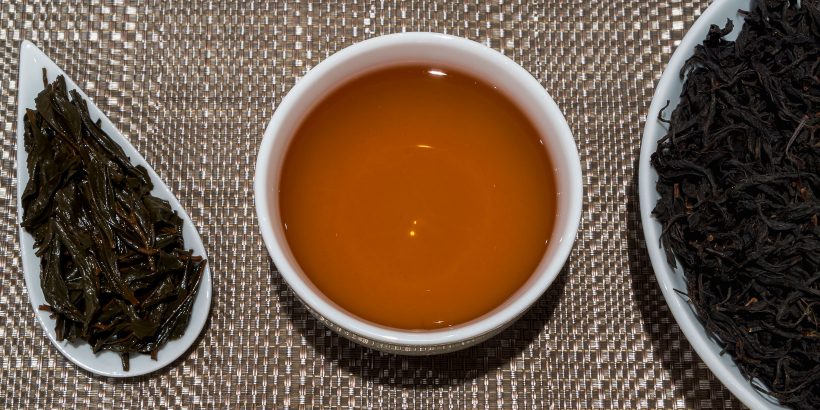
Ying Xiang Hong Cha (迎香紅茶) is a black tea crafted from a newly introduced Ying Xiang cultivar. It has a characteristic profile of complex savoury and fruity flavours and a lightly tannic aftertaste. Grown at Zhu Shan Township (竹山, Bamboo Mountain) of Nantou Province at an elevation of around 400m. The leaves of this batch were handpicked in July 2020.
This tea is crafted from a Ying Xiang TRES #20 cultivar that was introduced very recently by the Taiwan Tea Research and Extension Station. This cultivar resulted from years of research and development and is a cross of an unknown plant #2022 (most likely a Qing Xin cultivar) and a Jin Xuan TRES #12 cultivar. It was first released in 2004 and initially intended for production of Bao Zhong teas in northern Taiwan. However it was central Taiwan where TRES #20 cultivar started gaining attention, particularly in Nantou Province. The higher altitude growers have noticed a particularly pronounced aroma from the leaves of this new cultivar, hence giving it the Ying Xiang name, which can be translated as ‘Welcome Scent’ or ‘Inviting Aroma’.
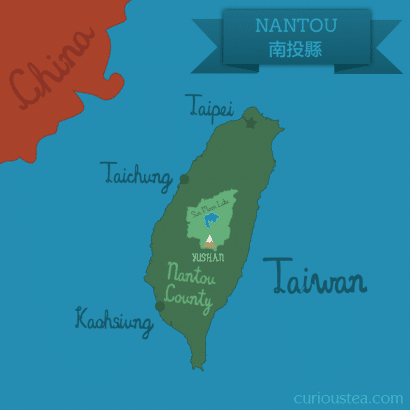
As this cultivar is still so new, the growers are still refining the growing and production methods for Ying Xiang teas. Many are producing lightly oxidised oolongs, with some good results especially from higher elevation gardens. Others, like in the case of this tea from Mr Chen, opted for a more creative approach by producing black teas. Certainly we find that this is a good choice as the resulting tea has that typical Taiwanese savoury black tea profile while having a more aromatic liquor with much smoother flavours. While we do class this as a black tea in the western style, it is known as Hong Cha according to Chinese classification. This is due to ‘black tea’ in China and Taiwan being normally referred to as hong cha (红茶 / 紅茶), or red tea.
When tasting this Ying Xiang Hong Cha, the ancestry of the plants of the new cultivar translate very well into balanced and smooth characteristics. The aromatic aspect is present throughout and the Jin Xuan side of the cultivar adds sophisticated velvety smoothness to the taste. The savoury profile is in common with other Taiwanese black teas, but it is not as overpowering. It is toned down by the more aromatic floral and fruity flavours and slightly earthy notes of bread and root vegetables, such as sweet potatoes. There are dark herbaceous notes on the finish and a lingering aftertaste with complex but not overwhelming tannins. This is an exciting brand new tea and we can’t wait to see what other new varieties will be produced from it in the near future!
It is best to brew this Ying Xiang Hong Cha black tea for 3-4 minutes in 90c temperature, reusing the leaves multiple times. For best results, we suggest gong fu brewing.
You can also buy Ying Xiang Hong Cha black tea in our online shop.
Mi Xiang Wu Yi Heritage Oolong
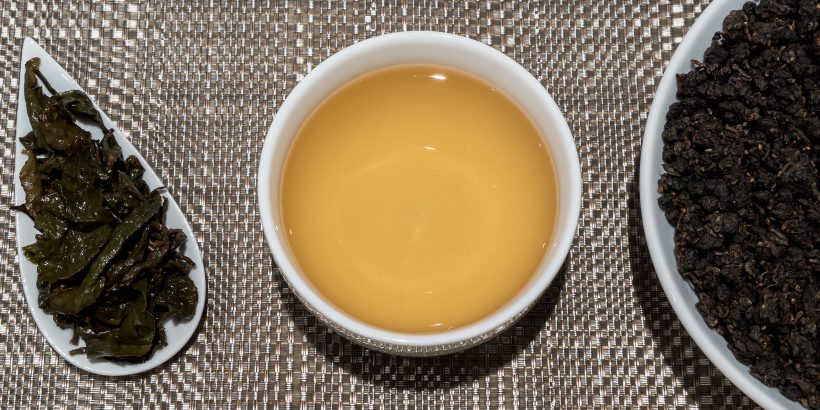
Mi Xiang Wu Yi Heritage Oolong (蜜香武夷烏龍茶) is an unusual tea from Mingjian Township of Nantou County, located in central Taiwan. This tea is crafted from a Wu Yi cultivar that was originally bright to Taiwan from Wu Yi Shan in Mainland China. This particular batch has a lovely ‘Mi Xiang’ (honey aroma) due to the leaves of the plants being nibbled by little green leaf hoppers during growth. The leaves of this tea were handpicked in November 2020 at a garden located at an altitude of around 400m. After harvest, this tea was finished by our Tea Master by extensive baking. This batch was baked twice, with the bakes lasting over 12 hours each. This is a one-off batch, so limited quantity available and once sold out we are unlikely to restock.
Our Mi Xiang Wu Yi Heritage Oolong is carefully crafted by Mr. Ji from plants that are descendants of a Wu Yi cultivar (referred to as Wu Yi Zhong, 武夷種). It was brought to Taiwan over 100 years ago from Wu Yi Shan where it is used for producing both oolong and black teas. With the subsequent Japanese rule over Taiwan, the tea landscape was much altered and a lot of the traditional cultivars that were brought from China were lost or simply replaced. The reinvigoration of the Taiwanese tea industry in the last century also meant that new cultivars were developed locally and have supplanted some of the older varieties. So it is not very common to see a cultivar such as this being used in Taiwanese tea production. While the cultivar originated from Wu Yi Shan, of course it has since undergone natural changes that make it unique and different in its own right. However you cannot escape noticing some similarities to traditional Wu Yi Rock teas, such as the underlying mineral aspect.
The Mi Xiang flavour found here is similar to other ‘Beauty’ teas. These are unique teas favoured for their honey-like profile that occurs due to presence of little green leaf hoppers (Jacobiasca formosana) that nibble the tea leaves during growth. The tea plants react to this attack by producing more polyphenols, which during processing give the unique ‘beauty tea’ flavour. These tea jassids are an essential aspect in production of some Taiwanese teas. However as the presence and effect of the tea jassid in each harvest cannot be replicated by humans, each harvest is different from one to the next. So treat this batch as a particularly fine vintage of wine. While the Tea Master will always try to bring out the desired unique flavours in different batches, this batch is very much a one-off and we will unlikely to get this tea again soon.
This Mi Xiang Wu Yi Heritage Oolong is finished by our Tea Master in a traditional style that has undergone extensive baking. She sought to recreate a type of tea she used to enjoy growing up that her late father used to make. These complex, heavier roasted oolongs that were popular in Taiwan 30+ years ago have been largely replaced by the lightly oxidised floral versions popular today. While both types have a distinct and attractive character, there is a particular appeal in the complex and skilfully crafted heritage-style teas such as this one. It is truly a labour of love and a fitting tribute to a more traditional style of Taiwanese tea.
The leaves of this Mi Xiang Oolong come in tightly rolled pearls and are medium oxidised. The baking level is around 5/10, resulting in a soft and velvety flavour that is not too overpowering on the roast flavour. This tea is finely balanced with roast flavours complimenting the fine honey-like character. The complex flavours are sweet, yet tangy, with floral and fruity notes. The definite Mi Xiang note is present but again it is not overpowering, nicely complimenting the other flavours. There is also a mineral aspect to this tea that can be attributed to the Wu Yi plants used throughout the tasting and on the lasting aftertaste. This is an excellent tea that is elaborate, comforting and exciting.
This tea is best brewed with water at 90°C for 3-4 minutes and the leaves can be brewed 3+ times. For best results brew gong fu style. For fans of aged oolong, this tea will also age extremely well.
You can also buy Mi Xiang Wu Yi Heritage Oolong tea in our online shop.
We really do hope that you enjoy the tea selection for January and are looking forward to the selection in our next box. Our February box will feature a Darjeeling green tea from Gopaldhara, a Japanese Honyama Sencha, a roasted Assam Oolong from Latumoni and a Liu Bao Hei Cha from wild tea trees!
If reading this has made you curious about our teas, but you don’t yet subscribe to a monthly tea selection, you can sign up for our tea boxes in just a few clicks. We ship worldwide from London, UK.
We always love to hear from you, so if you have any questions, suggestions or just want to chat about tea, email us at contact@curioustea.com, via our Facebook page or via Twitter.
You can also follow us on Instagram for pretty tea photos.
Happy tea discoveries!

